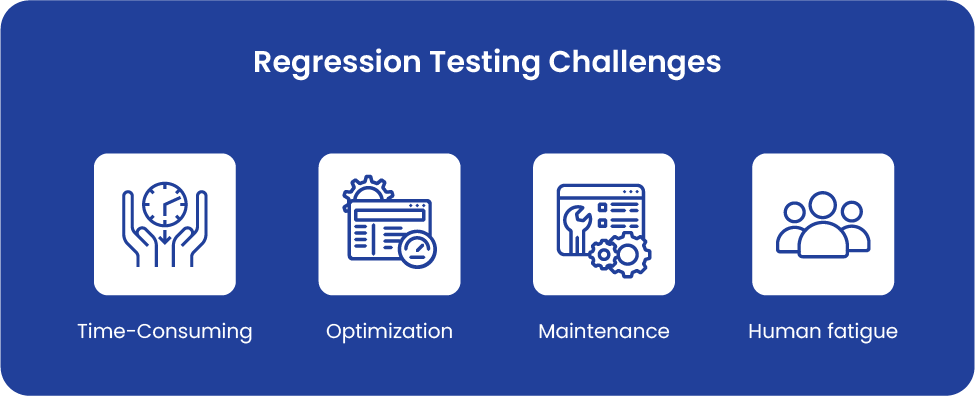Imagine this: your agile team is racing to hit that sprint deadline, adding new features and polishing the app. But there’s this constant worry — every new feature might break something that’s already working. Regression testing should have your back, but traditional methods? They’re slow, manual, and feel outdated.
Now, think of AI-driven regression testing as your team’s new sidekick. It’s fast, intuitive, and keeps bugs from slipping through, automating and sharpening your testing so you can focus on what’s next, not on what might break.
The Challenges of Traditional Regression Testing

Despite its importance, traditional regression testing presents several obstacles, especially for agile teams focused on speed and flexibility.
- Time-Intensive Processes: Regression testing often requires a large suite of test cases to be run after every code change, which is time-consuming and may delay the release cycle.
- Human Error Risks: With manual testing, the risk of missing scenarios or overlooking issues is high. This can lead to bugs slipping through to production, compromising software quality.
- High Maintenance Requirements: In dynamic environments where software evolves quickly, test cases must be continuously updated, adding maintenance burdens on the testing team. Manually adjusting these tests is costly and challenging to keep up with rapid releases.
As these challenges mount, AI has become an appealing solution to automate and optimize regression testing processes, making them faster, more accurate, and more adaptable to frequent changes.
How AI Transforms Regression Testing
AI-powered regression testing is revolutionizing how companies handle this critical aspect of quality assurance by enabling automated, intelligent testing that goes beyond traditional capabilities.
- Automated Test Case Generation and Self-Healing: AI can autonomously generate test cases and update them when changes are detected in the application. This “self-healing” capability means that tests evolve with the software, drastically reducing the manual effort required to maintain them.
- Intelligent Test Case Selection: By analyzing historical test data and identifying areas most likely to break, AI can smartly select relevant test cases for each regression cycle. This ensures that the most impactful tests are run, focusing efforts on parts of the code with a higher likelihood of issues.
- Faster Defect Prediction and Prioritization: AI-powered testing tools can use pattern recognition to predict potential defects in the code and prioritize them based on severity and impact. This helps testing teams address high-risk issues quickly, enhancing overall software reliability.
Key Benefits of AI-Driven Regression Testing
| Perspective | Key Benefits |
|---|---|
| Developer’s Perspective | Early Defects: Shift Left Testing identifies defects earlier, reducing risks. Improved Code Quality: AI insights help create robust code. Accelerated Development: Automation handles repetitive testing, freeing development time. |
| Tester’s Perspective | Defect Prediction: Tools predict defects, providing actionable insights. Higher Test Coverage: AI generates new and edge test cases. AI Healing®: Self-healing capabilities adapt tests to code changes. |
| Business Perspective | Cost Savings: Optimizes resources and lowers costs. Faster Time-to-Market: Accelerated testing boosts release speed. Data-Driven Decisions: Insights support informed decision-making. Scalability: Easily scales to project requirements. |
By integrating AI into regression testing, companies can experience a range of benefits that address both speed and quality needs in agile environments.
- Efficiency Gains: Automated testing with AI reduces the time taken to run regression tests, allowing faster feedback and accelerating the time to market for new features.
- Improved Coverage and Quality: AI-driven testing tools offer comprehensive test coverage by generating intelligent test scenarios. This helps uncover more defects, ensuring that updates don’t disrupt existing functionality and that quality is maintained across releases.
- Cost Optimization: By reducing manual intervention and focusing testing efforts where they’re needed most, AI in regression testing cuts down on labor costs and resources while improving output quality.
- Scalability and Flexibility: AI-based tools can scale with project requirements, whether you’re working on a single application or a suite of interconnected systems. They adapt to new functionalities, integrations, or features without needing extensive reconfigurations.
Smarter Testing, Faster Releases. Power Up with Indium’s AI Solutions
Get in touch
Real-World Applications
AI in regression testing is proving valuable across industries, providing practical benefits for companies facing high user expectations and rapid development cycles.
- Financial Services: Financial applications require constant updates to stay secure and compliant. AI-driven regression testing helps these applications meet regulatory standards and detect vulnerabilities swiftly.
- Healthcare: Healthcare applications need to be reliable and free from bugs that could impact patient data or care delivery. AI-enhanced testing ensures these systems work as intended, even with frequent updates.
- E-Commerce: With changing customer preferences, e-commerce platforms are constantly evolving. AI-driven regression testing keeps up with these changes, reducing the risk of errors that might affect user experience or transactions.
Through these applications, AI-driven testing tools help reduce deployment risks and allow companies to innovate confidently, knowing that their testing processes are optimized for high performance and reliability.
Conclusion and Future of AI in Regression Testing
As AI technologies evolve, so will their potential to automate, enhance, and streamline regression testing processes. AI’s capabilities in automated test case generation, intelligent test selection, and defect prediction position it as an invaluable asset for companies striving to meet modern software development demands. The future of AI in regression testing promises further efficiency, scalability, and precision, making it a transformative technology in quality assurance.
For organizations looking to maintain a competitive edge in agile environments, exploring AI-driven regression testing solutions is a powerful way forward. By embracing AI, companies can deliver software that meets user expectations while navigating the complexities of continuous change.




